Endocrine Glands And Hormones: Function, Organs, Diseases
Endocrine glands are those organs whose secretion is directly poured into the blood. These hormones regulate essential body functions like growth, metabolism, and reproduction. It helps to maintain a balance in the human body by coordinating various organs. In this article, the endocrine system, endocrine glands, and major endocrine glands and their hormones are discussed. Endocrine Glands and Hormones is a topic of the chapter Chemical Coordination and Integration chapter of Biology.
Don't Miss: Most scoring concepts for NEET | NEET papers with solutions
NEET 2025: Syllabus | PYQs | Crack NEET in 2 months - Study Plan
NEET Important PYQ & Solutions: Physics | Chemistry | Biology | NEET PYQ's (2015-24)
- The Endocrine System
- What are Endocrine Glands?
- Major Endocrine Glands and their Hormones
The Endocrine System
The endocrine system is an integrated system of ductless glands that function in the production and secretion of hormones into the general blood circulation, organizing and regulating activities within the body. That is, in a way, hormones can be likened to chemical messengers that move through the blood into target tissues or organs and control a wide range of physiological activities that commence from growth to metabolism, mood, and reproductive functions.
What are Endocrine Glands?
The endocrine glands in the human body are special organs that produce and secrete hormones directly into the bloodstream, thereby controlling such a wide array of physiological processes as those related to growth, metabolism, and homeostasis. Those include major glands such as the pituitary, thyroid, adrenals, and pancreas, which participate in the maintenance of internal balance.
Unlike exocrine glands, which release secretions through ducts to specific locations like sweat glands or salivary glands, the endocrine glands are ductless and require the circulatory system for transmission. This direct release into the circulatory system results in a diffuse action, systemic in nature, required for the coordination of activities of the body over long periods and responses to internal and external stimuli. The endocrine system plays a vital role in maintaining homeostasis, affecting growth and development, and regulating reproduction, therefore, keeping a person healthy and fit.
Also Read:
- MCQ Practice on Hormones
- Chemical Control and Integration
- Endocrine System
- Neural Control and Coordination
Major Endocrine Glands and their Hormones
The major endocrine glands are:
Pituitary Gland
The pituitary gland is a pea-sized endocrine gland located at the base of the brain directly behind the socket of the eye and just below the hypothalamus. It is enclosed within a bony prominence of the sphenoid bone, the sella turcica.
Hormones Produced by Pituitary Gland
Growth Hormone (GH): Stimulation of growth and cell reproduction.
Prolactin: Milk production within the mammary glands.
Adrenocorticotropic Hormone (ACTH): Stimulation of the adrenal cortex to release cortisol.
Thyroid-Stimulating Hormone (TSH): Stimulation of the thyroid gland to produce thyroid hormones.
Follicle-stimulating hormone (FSH): It regulates the reproductive process. This includes activities such as maturation of ovarian follicles and spermatogenesis.
Luteinizing Hormone (LH): Ovulation stimulation and maintenance of sex hormone secretion.
AT or ADH: Water amount regulation in the body, water reabsorption in kidneys.
Oxytocin: Uterine contractions at birth, Milk letdown, lactation.
Functions and effects on the body
This is sometimes thought of as the "master gland" and does act in a manner somewhat similar to the pituitary gland. Such functions, through the release of hormones, actually do different facets of the body to control other endocrine glands. It has a very vital role in growth, metabolism, stress response, and reproductive processes.
Hypothalamus
Connection with the pituitary gland
The hypothalamus lies just above the pituitary gland and communicates with it through the hypothalamic-pituitary portal circulation, a system of blood vessels that enables the direct exchange of hormones between the two.
Hormones Produced by Hypothalamus
Thyrotropin Releasing Hormone (TRH): Stimulates TSH release from the pituitary.
Corticotropin Releasing Hormone (CRH): Stimulates ACTH release from the pituitary.
Gonadotropin-releasing hormone (GnRH): Controls the release of FSH and LH from the pituitary.
Growth Hormone Releasing Hormone: stimulates growth and development.
Somatostatin: Inhibits GH and TSH release.
Dopamine: Inhibits prolactin release.
Role in homeostasis and hormone regulation
Through its control over the activities of the pituitary, the hypothalamus indirectly regulates many of the body's functions, from overall growth and development to metabolic rate, responses to stress and reproductive activities.
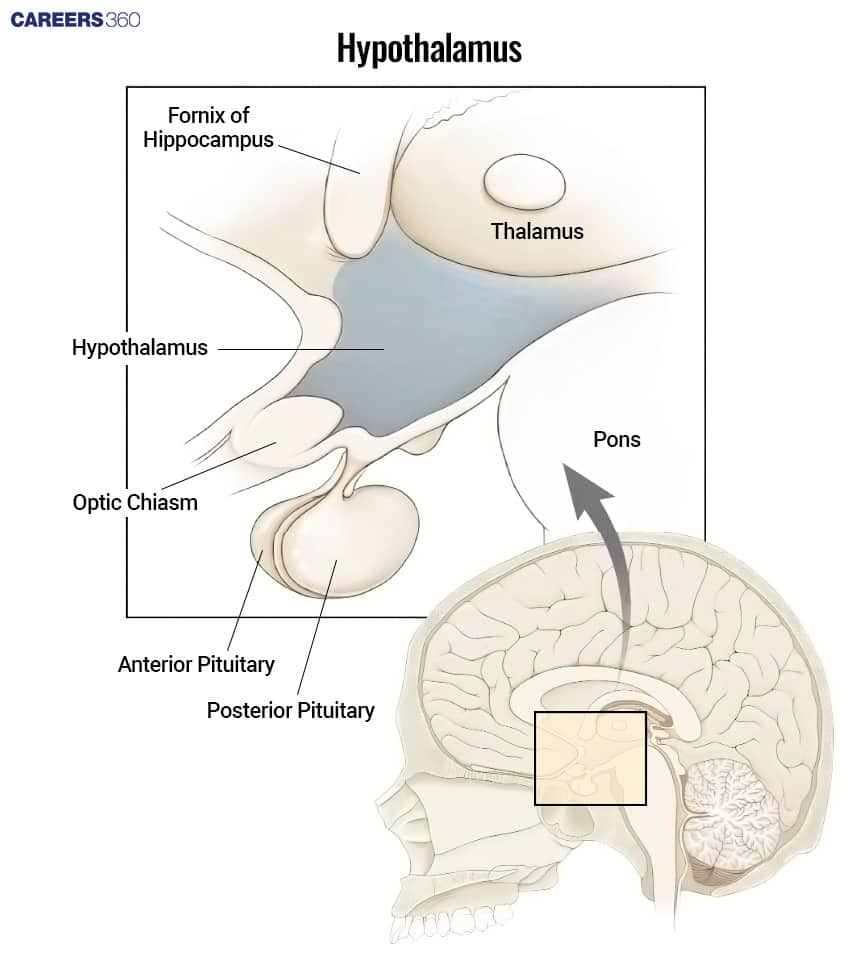
Thyroid Gland
It is located anterior to the trachea in the neck. The thyroid gland has two lobes joined at an isthmus
Hormones Produced by Thyroid Gland
Thyroxine and Triiodothyronine, T4 and T3: This mediates the metabolic processes, producing energy, and growth.
Calcitonin: This reduces blood calcium through the inhibition of bone resorption and with an increased calcium deposition within the bones.
Functions and effects on metabolism, growth, and development
As mentioned, thyroid hormones regulate the metabolic rate, which affects growth. In addition, they are also necessary for maturation of nervous tissue.
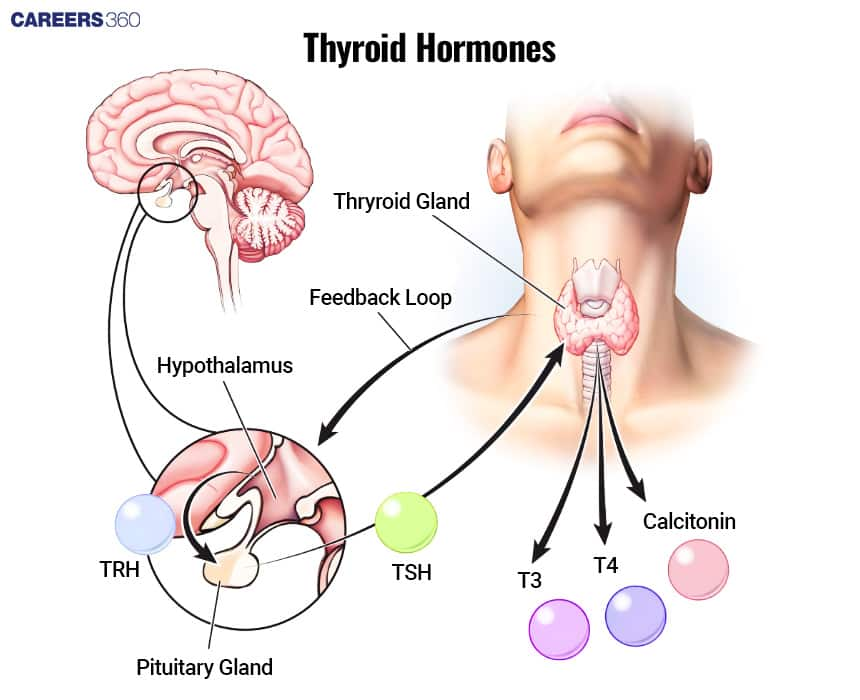
Parathyroid Glands
The parathyroid gland has four small glands on the posterior surface of the thyroid gland.
Hormones Produced by Parathyroid Gland
Parathyroid Hormone (PTH): As a consequence of increased bone resorption, improved renal calcium reabsorption, and stimulation of intestinal calcium absorption, PTH brings up the level of calcium in the blood.
Functions and regulation of calcium levels
PTH controls the level of calcium required to keep the proper working of the muscles, transmission of nerve impulses, and correct bone health.
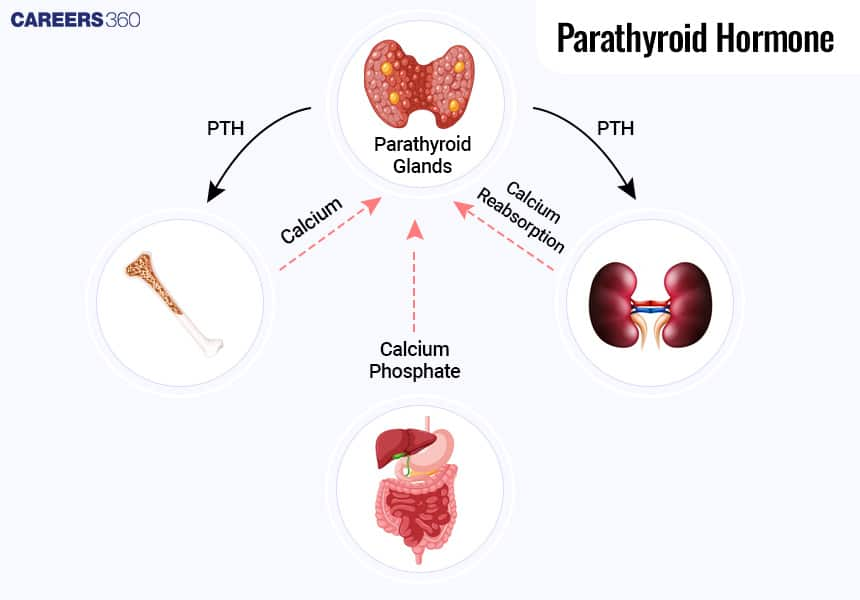
Adrenal Glands
Two adrenal glands sitting at the top of each kidney are divided into two distinct parts—the cortex and the medulla.
Hormones Produced by Adrenal Glands
Cortisol: Controls the metabolism, and immune response, and enables the body's response to stress.
Aldosterone: Controls the balance of sodium-potassium. The product of this event affects blood pressure.
Adrenaline or Epinephrine and Noradrenaline or Norepinephrine: These are sometimes referred to as "fight-or-flight" hormones. During dangerous situations, they increase heart rate, blood pressure, and energy supply.
Functions and response to stress
The adrenal glands are mainly concerned with the management of stress reactions and controlling a wide array of metabolic and physiological activities.
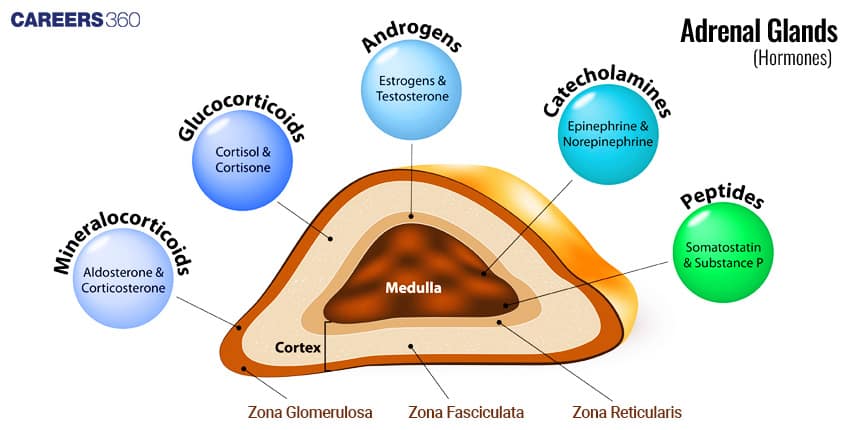
Pancreas
Dual role as an endocrine and exocrine gland.
The pancreas acts both as an endocrine gland concerning the production of hormones and as an exocrine gland concerning the secretion of digestive enzymes.
Hormones Produced by Pancreas
Insulin: It reduces blood sugar by increasing the uptake of glucose by cells.
Glucagon: It increases blood sugar by releasing glucose that is stored in the liver.
Somatostatin: This is against the release of both insulin and glucagon.
Functions and regulation of blood glucose levels
The pancreas controls the concentration of glucose in the blood through actions of insulin and glucagon. Hence this maintains homeostasis in energy
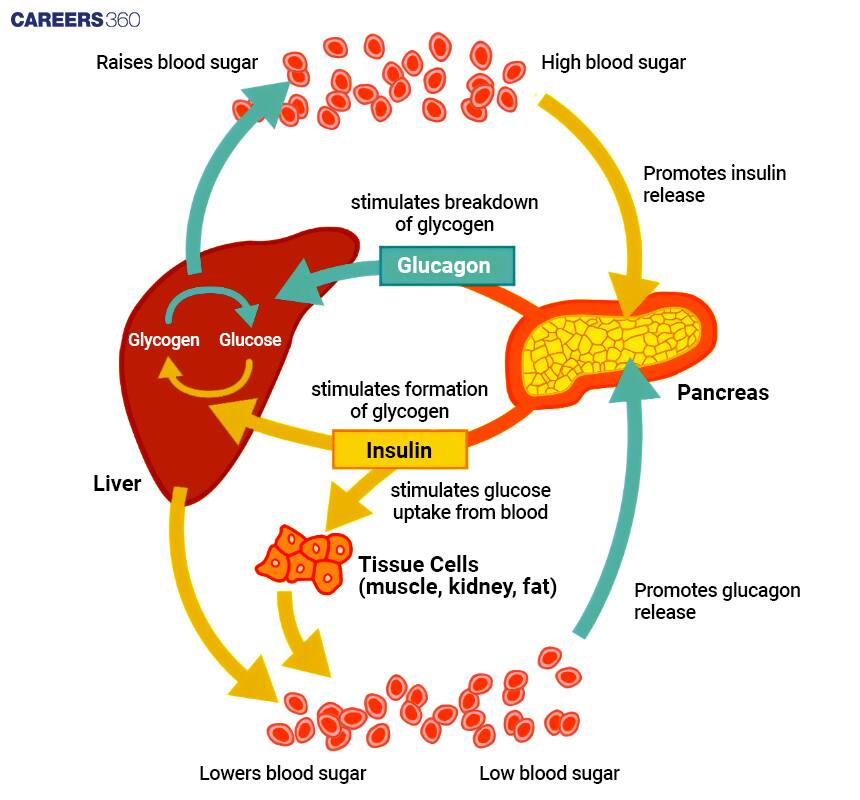
Pineal Gland
Pineal Gland is a very small, pea-shaped gland, which rests in the epithalamus of the brain close to the middle of the brain.
Hormone Produced by Pineal Gland
Runs an individual's sleep-wake cycle and is also responsible for seasonal biological rhythms.
Functions and regulation of sleep-wake cycles
Melatonin appears to play a role in the production of the 'circadian rhythm' and sleep-wake cycles and, therefore, acts as the 'body clock.'
Gonads (Testes and Ovaries)
Testes are in the scrotum whereas ovaries are in the pelvic cavity.
Hormones produced:
Testosterone: It controls male reproductive functions as well as secondary sexual characteristics.
Estrogen and Progesterone: They regulate female reproductive activity, the menstrual cycle, and the manifestation of secondary sexual characteristics.
Functions and roles in reproduction and secondary sexual characteristics
Gonads play a crucial role in reproduction and in expressing secondary sexual traits and, therefore impact the physical characteristics and behaviours defining sexual maturation.
Also Read:
| Mechanism of Hormone Action | Hormone Receptors |
| Adrenal Cortex | Adrenal Medulla |
| Difference between Thyroid and Parathyroid | Adrenal Insufficiency |
Recommended Video for Endocrine Glands and Hormones
Frequently Asked Questions (FAQs)
It is referred to as a couple of organs called glands that are in charge of producing and secreting hormones to regulate a few activities within the body, such as metabolism, growth, and reproduction.
Major endocrine glands include the pituitary, hypothalamus, thyroid, parathyroid, adrenals, pancreas, pineal, and gonads.
Hormones are chemical messengers in the blood that act on tissues and organs to control metabolism, growth, mood, and reproductive functions.
Common disorders of this kind include diabetes mellitus, hypothyroidism, hyperthyroidism, Cushing's syndrome, Addison's disease, and growth hormone disorders like gigantism and dwarfism.
Diagnosis of endocrine disorders is made by blood tests, imaging techniques and physical examinations; treatment may be in the form of hormone replacement therapy, drugs and lifestyle changes; at times, surgical intervention may also be required.
The thyroid gland produces thyroxine and triiodothyronine which are involved in the regulation of the metabolic rate, growth and development and calcitonin, which is responsible for calcium homeostasis.
The pancreas secretes hormones like insulin and glucagon and maintains the blood sugar at a normal level.
Also Read
30 Nov'24 08:31 PM
30 Nov'24 06:39 PM
30 Nov'24 05:52 PM
30 Nov'24 12:49 PM
30 Nov'24 11:55 AM
30 Nov'24 09:54 AM
30 Nov'24 09:06 AM